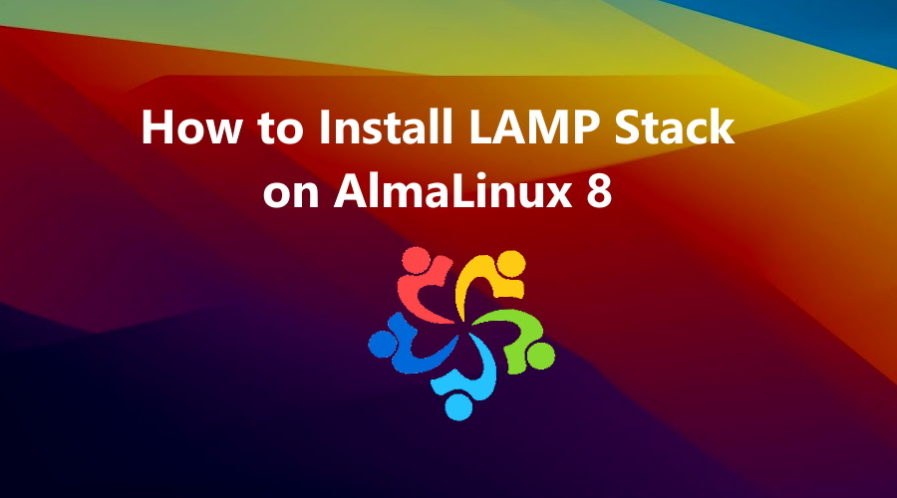LAMP is a popular open-source software stack that is mostly used for testing and hosting web applications. It’s an acronym for Linux Apache MariaDB / MySQL and PHP.
Apache is a popular open-source and widely used web server. MariaDB is a free and open-source, commercially supported relational database management system, and PHP is a server-side scripting language used for developing dynamic web pages.
In this tutorial, we will show you how to install LAMP stack on AlmaLinux 8.
Update Operating System
Update your AlmaLinux 8 operating system to make sure all existing packages are up to date:
$ sudo dnf updateInstall Apache webserver
Well, like most of the Linux operating systems, we don’t have to add any third-party Repos to install Apache- HTTPd server.
You can install Apache via dnf package manager by executing the following command.
$ sudo dnf install httpdApache does not start automatically when it is installed. You can start the Apache service and configure it to run on startup by entering the following commands:
$ sudo systemctl start httpd
$ sudo systemctl enable httpdVerify the status of the Apache service using systemctl status command:
$ sudo systemctl status httpdOutput:
● httpd.service - The Apache HTTP Server
Loaded: loaded (/usr/lib/systemd/system/httpd.service; disabled; vendor preset: disabled)
Drop-In: /usr/lib/systemd/system/httpd.service.d
└─php-fpm.conf
Active: active (running)
Docs: man:httpd.service(8)
Main PID: 36360 (httpd)
Status: "Running, listening on: port 80"
Tasks: 213 (limit: 11221)
Memory: 38.6M
CGroup: /system.slice/httpd.service
├─36360 /usr/sbin/httpd -DFOREGROUND
├─36375 /usr/sbin/httpd -DFOREGROUND
├─36376 /usr/sbin/httpd -DFOREGROUND
├─36378 /usr/sbin/httpd -DFOREGROUND
└─36405 /usr/sbin/httpd -DFOREGROUND
If firewalld is enabled consider allowing HTTP and HTTPS services:
$ sudo firewall-cmd --permanent --add-service={http,https}
$ sudo firewall-cmd --reloadYou can test to make sure everything is working correctly by navigating to:
http://your-IP-addressIf everything is configured properly, you should be greeted by the default AlmaLinux Test Page, as seen below.
Install MariaDB 10.7
MariaDB 10.7 is the latest release version for this relational database system. To be able to install MariaDB 10.7 on AlmaLinux 8 you need to add the MariaDB YUM repository:
$ curl -LsS -O https://downloads.mariadb.com/MariaDB/mariadb_repo_setup
$ sudo bash mariadb_repo_setup --mariadb-server-version=10.7Once the repository has been added to the system, installing MariaDB is an easy task that can be accomplished with the following command:
$ sudo dnf install MariaDB-server MariaDB-clientOnce the installation is complete, verify the installed version of MariaDB.
$ sudo dnf info MariaDB-serverStart the database server daemon, and also enable it to start automatically at the next boot with the following commands:
$ systemctl start mariadb
$ systemctl enable mariadbCheck the status of the service:
$ systemctl status mariadbExample output:
$ ● mariadb.service - MariaDB 10.7.1 database server
Loaded: loaded (/usr/lib/systemd/system/mariadb.service; enabled; vendor preset: disabled)
Drop-In: /etc/systemd/system/mariadb.service.d
└─migrated-from-my.cnf-settings.conf
Active: active (running)
Docs: man:mariadbd(8)
https://mariadb.com/kb/en/library/systemd/
Main PID: 35787 (mariadbd)
Status: "Taking your SQL requests now..."
Tasks: 13 (limit: 11221)
Memory: 68.0M
CGroup: /system.slice/mariadb.service
└─35787 /usr/sbin/mariadbd
Secure MariaDB
Run mariadb-secure-installation script which helps you secure your MariaDB database server:
$ sudo mariadb-secure-installationYou can set a root password for MariaDB along with removing empty databases, restricting remote access except for localhost, removing anonymous users, and more:
Set root password? [Y/n] Y
Remove anonymous users? [Y/n] Y
Disallow root login remotely? [Y/n] Y
Remove test database and access to it? [Y/n] Y
Reload privilege tables now? [Y/n] YInstall PHP 8.1
Currently, PHP 8.1 is not featured in AlmaLinux’s AppStream. However, you can install PHP from (Remi) repository, a free-to-use third-party repository that deploys the latest PHP 8.1 builds.
To install EPEL, use the following (dnf) terminal command:
$ sudo dnf install epel-releaseNow that you have added the EPEL repository, enable (Remi repository) with the following command:
$ sudo dnf install dnf-utils http://rpms.remirepo.net/enterprise/remi-release-8.rpmUse the (dnf) command to update your repository list:
$ sudo dnf updateNext, enable PHP 8.1 with the following command:
$ sudo dnf module enable php:remi-8.1Now that you have added the Remi PHP repository and enabled PHP 8.1 to be the default version on your system, you can install PHP 8.1 with the following command:
$ sudo dnf install phpYou can check your PHP version using the following command:
$ php -vExample output:
PHP 8.1.1 (cli) (built: Dec 15 2021 02:00:45) (NTS gcc x86_64)
Copyright (c) The PHP Group
Zend Engine v4.1.1, Copyright (c) Zend Technologies
with Zend OPcache v8.1.1, Copyright (c), by Zend TechnologiesIf you would like to install the most commonly used extensions for PHP 8.1, use the following command:
$ sudo dnf install php-cli php-fpm php-curl php-mysqlnd php-gd php-opcache php-zip php-intl php-common php-bcmath php-imap php-imagick php-xmlrpc php-json php-readline php-memcached php-redis php-mbstring php-apcu php-xml php-dom php-redis php-memcached php-memcacheYou can check your PHP modules using the following command:
$ php -mExample output:
[PHP Modules]
..............
igbinary
imagick
imap
intl
json
libxml
mbstring
memcache
memcached
msgpack
mysqli
mysqlnd
openssl
..............
[Zend Modules]
Zend OPcacheComments and Conclusion
In the tutorial, you have learned how to install LAMP stack on AlmaLinux 8.
If you have any questions please leave a comment below.

1 thought on “How to Install LAMP Stack on AlmaLinux 8.5”